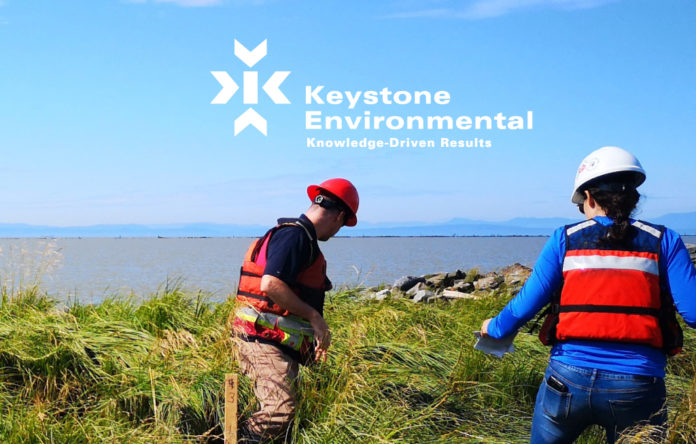
A BC-based Environmental Consultancy Accomplishing Important Work and Making Big Moves
Keystone Environmental is a knowledge-driven, solutions-oriented environmental consultant firm with a history stretching back nearly 40 years. Across those many years, the company’s goals, culture and methodology has continuously grown and evolved, as has the reach and depth of their services. Today, their team is over 115-strong, and includes professional engineers, geoscientists, toxicologists, agrologists, biologists, environmental scientists, Geographic Information Systems professionals and more. Their clients, meanwhile, include organizations of all sizes in both the public and private sectors – including those in the transportation sector (airport, public transit, ports and railways), infrastructure and development industry, forestry sector, liquefied natural gas, and mining industry. In recent years, they have worked increasingly close with Indigenous communities, and have invested in cultural awareness training to make those projects and relationships successful.
Celebrating teamwork
Over their long history, Keystone Environmental has continuously invested internally, in the wellbeing of their staff. They recognize that their employees play a critical role in their continued success, and as their team has grown, they have strived to promote a culture of employee engagement and collaboration. Their efforts in that arena have been repeatedly award-recognized – for five consecutive years, since 2018, the company has been named one of Canada’s Top 100 Small & Medium Employers and Canada’s Best Employer for Recent Graduates, and in 2020 they were named Top Employer at the ECO Impact Awards.
Raminder Grewal is the President of Keystone Environmental. He joined in 2000 as an environmental engineer conducting fieldwork, he became a partner in 2007, and he was named to his current role in 2013. In his time with the company, he says one of their “main focuses” has been building a strong corporate culture and retaining staff.
“We want Keystone Environmental to be a place where people come for a career, not just a job,” he says. “That’s been a big focus of ours for several years. We’re committed to providing a career path for everyone who works here.”
That commitment is reflected in the makeup of Keystone Environmental’s senior staff. All the department heads, except for two have been with the company for at least 10 years. They all started in junior positions and promoted based on their performance.
“Our goal is to one day be a company where we’re only hiring people directly from universities and then only promoting from within,” Raminder says. “We want to provide career paths. We want to give people opportunities. That’s extremely important to us.”
Mike Farnsworth, Senior Project Manager and Team Lead, is a good example of someone who’s walked that path – he joined the company in 2005 and has been there ever since.
“There’s a core team of us with over 15 years’ experience with the company,” Mike explains. “There are about 12 of us now, and two of those people have been here over 25 years. That shows you something about this company. Once you get hired here, you want to stay. I think that might be hard to say about other companies.”
Mike, personally, says he’s stayed with the company partly because of how interesting the work is. Keystone Environmental works in a variety of sectors, on different projects, and the corporate culture is very collaborative. “Everyone has a voice,” Mike says, and employees “get to wear a lot of different hats and try a lot of different things – that keeps things interesting.”
Also, Mike says he has enjoyed growing alongside his colleagues, many of whom have stuck around just as long. “It really does become a second family.”
Raminder, meanwhile, credits the company’s retention to many factors – which, again, have been vetted and affirmed by organizations such as Canada’s Top Small & Medium Employers competition. Between 2018 and 2022, the company won that distinction five years in a row in recognition of their growth (they hired 34 new employees in 2021 alone), the social events and celebrations they hosted to keep employees engaged (including a Christmas dinner and dance, a company picnic in the summer, mini golf tournaments and staff appreciation lunches), and the variety of financial benefits they offer (including year-end profit-sharing / performance bonuses for all employees, an RRSP matching program, and generous employee referral bonuses of up to 6,000).
In 2021, the company was commended for a lot of the same reasons. Additionally, they were recognized for helping employees balance their day-to-day responsibilities through alternative working options, including flexible hours, shortened work weeks, and tele-commuting. They were also praised for starting new employees with three weeks of paid vacation and considering previous work experience when setting vacation entitlement for experienced candidates.
Of course, the 2021 award also considered the company’s pandemic response. Keystone Environmental was applauded for quickly moving employees to work-from-home arrangements, cancelling in-person meetings and transitioning to online meetings, implementing enhanced cleaning protocols, and providing onsite employees with needed personal protective equipment.
During that tumultuous time, Raminder admits it was challenging to reconcile their two biggest priorities – keep everyone safe and healthy, and preserve their carefully-cultivated team culture. Migrating in-person activities online was only part of the solution. Prior to the pandemic, he personally had an open-door policy, and the company worked very collaboratively between departments. To replicate that atmosphere, they utilized several solutions. One of the more amusing-but-effective solutions was roving iPads – employees at home could log in via their devices to drive the wheeled apparatus around the office, which remained open throughout the pandemic, to find and talk to the person they were looking for.
“We wanted people to still feel connected,” Raminder says. “We wanted to do everything we could to make sure people still felt engaged.”
Furthermore, Keystone Environmental also recognized that the prolonged pandemic and isolation were taking a toll on the mental health of their employees. To combat that toll, they implemented an Employee and Family Assistance Program to ensure that employees and their families could get the support they needed throughout the crisis. That program is emblematic of the “holistic approach” that Keystone Environmental takes, where they place as much emphasis on mental and personal well-being as they do professional development.
“We care about our staff,” Raminder says, “and not just our staff, but also their extended families. We know we play a big part in their lives. We take that responsibility seriously.”
That holistic approach, Raminder reiterates, is a big part of how the company retains people. Equally important, however, is that they identify people they want to retain in the first place.
“We’ve put a lot of focus on hiring the right people and making sure the fit is right to begin with,” he says. “We feel like we can train the technical side – it’s more important that we find people who fit our culture.”
Part of that culture is diversity. Keystone Environmental employs a large roster of both men and women of diverse backgrounds. Raminder personally knows that hasn’t always been the case in their industry.
“When I first started going to networking events, it was not diverse,” he recalls. “But I give a lot of credit to the senior staff here – they are very open and welcoming and really want to promote people based on their abilities. There is no glass ceiling. To me, that’s a big part of what makes us special.”
Keystone Environmental hasn’t invested so much in being special just for the sake of their staff. They firmly believe that by having a longstanding and engaged workforce they can provide better solutions to their clients.
“It leads to better quality of work,” Mike says. “When you’ve got people who’ve been around for a long time, people who are tried, tested and true, you can find solutions faster and easier.”
It also helps, Mike says, when you have an engaged staff that likes working together and knows how to collaborate. That kind of teamwork can result in solutions that wouldn’t be possible in offices where employees worked more separately and independently.
Raminder gives an example: there were some major changes to the Ministry guidelines a few years ago, which made for a very stressful time as they had to get reports in by a certain time and date.
“We had people working around the clock to make sure we hit those deadlines,” he says. “But what really made me proud was that I saw emails going around of people saying ‘Hey, I’m done my project, does anyone need help?’ That said a lot to me. That showed we have each other’s backs when times are tough.”
Relationship-based
Currently, Keystone Environmental is made up of three main technical departments: Contaminated Sites, Biological services, and Engineering services. All three departments service the company’s diverse client base. They also have a subsidiary company (Sterling IAQ Consultants) that provides Indoor Air Quality and related services. These days, Raminder believes that their clients in those sectors mainly choose Keystone Environmental due to the relationships they have built together over the years.
“We’re very relationship based,” he says. “We get to know our clients very well. We really try to understand their business objectives. We try to understand how the environmental piece of their project fits into the bigger picture. Then we can show them the hurdles they’re going to face and map out a way for them to get through them and achieve the result they want.”
“We’re seen as trusted advisors for many of our clients,” he adds. “They’ll call us early on to discuss a site and seek our advice.”
Many of Keystone Environmental’s clients go back a decade or more. Raminder believes that the company has earned that loyalty, at least partly, by being so responsive.
“Our goal is to always get back to clients within a couple of hours. That doesn’t mean having all the answers all the time, but if there’s an outstanding email or a call, it means acknowledging it. Just writing back ‘I got your email, let me get back to you’ goes a surprisingly long way. That’s earned us a lot of good will, I think because it shows that we understand the urgency. We know that if a client is calling us, they’re calling us for a reason.”
Another key part of retaining customers is providing value, Mike adds. That’s where Keystone Environmental’s three departments and multidiscipline staff come into play.
“We don’t just specialize in one thing,” Mike explains. “We have multiple skillsets. We could be working with a client on a contaminated site and say ‘Hey, did you consider this biological challenge or this engineering issue?’ And we don’t just present the problem; we also come up with solutions. That can save clients a lot of time and money down the line.”
That ability to come up with solutions, Raminder reiterates, is a credit to the company’s staff and collaborative culture, as well as to their commitment to helping clients’ realize their end-goals.
“This is a result of sitting down with everyone involved right from the start,” he says. “We make sure everyone understands why we’re doing the project, what the purpose is, what our client’s objectives are. We make sure everyone on the team, no matter how junior or senior, is all on the same page.”
Keystone Environmental is also highly collaborative with their extended team, and Raminder credits that collaboration as well. He says they have formed partnerships with a variety of other firms and consultants – and not just in BC, but all over the country. Together, Raminder says they can now tackle virtually any project, no matter where it’s based geographically.
For example, the company has established a strong partnership with QM Environmental – a leading Canadian environmental and industrial services firm with offices and qualified teams located across the country. They offer everything from specialized services to large, complex end-to-end solutions. They have worked closely with Keystone Environmental on several significant projects and both parties look forward to working together more.
Keystone Environmental has established similarly strong relationships with other suppliers and sub-contractors. The company has an approved sub-contractor list with each company’s insurance, safety details and COVID-19 vaccination information already collected. They have developed a communication strategy to work effectively with their suppliers and sub-contractors as a single team to ensure seamless project management for their clients.
One such trusted partner is Underhill, one of the country’s most trusted professional surveying companies. Over their long history in business, they have continuously upgraded their technical capabilities and maintained the highest professional standards to service the rapidly-developing needs of their clients. Today, they provide services throughout BC, Yukon, Northwest Territories, Nunavut, and all of Canada.
Another close partner is Summit Earthworks – an experienced and conscientious construction contractor specializing in site remediation, site preparation, and habitat restoration. They service the Lower Mainland from their office in Mission, BC. Like all Keystone Environmental team members, they have a proven and certified commitment to quality, safety, and the health of the natural environment.
The same goes for VanMars Drilling, a partner based in Abbotsford BC. They are an innovative and evolving company dedicated to excellence in all aspects of drilling and environmental services. Their commitment to the health and safety of their clients, employees, and environment is also proven and industry-certified.
Opportunity & growth
Recently, Keystone Environmental has been working more and more with Indigenous communities, who are now partnering with developers more than ever before.
“We’re seeing a lot of partnerships between Indigenous communities and our developer clients,” Raminder says. “We’re kind of their go-to environmental consulting firm when it comes to developing land and going through the permitting process. Because we have these longstanding relationships, it’s a good fit. It makes sense for them to come to us.”
There’s also a federal government program to return the management of land back to Indigenous communities. As part of that transfer, Keystone Environmental is frequently brought in to assess the land for environmental liabilities.
“That’s a big part of our business now,” Mike says. “We do focus a lot on it. We’ve had a consultant come in and train our staff on cultural awareness when working with Indigenous people.”
Also, on September 30th, the National Day for Truth and Reconciliation – which is not a statutory holiday in BC – the company decided to give employees the day off to learn about residential schools and share what they learned the next day.
“That was pretty successful in terms of getting people engaged and increasing their awareness,” Mike says.
Moving forward, Keystone Environmental intends to continue promoting that engagement as their work in that sector continues. At the same time, they also intend to continue expanding their client base and service offering – but never to the point where their customer service suffers. The company is currently at a size where they can be responsive to clients and flexible internally, and they never want to compromise that.
“If anybody here identifies a concern, or if they have a good idea, action can be taken fairly quickly,” Raminder says. “We don’t have to go through a head office and wait for a decision. That’s the advantage of being a midsized company and not a large one.”
“We want to stay at that size,” Mike adds. “That’s part of our mandate. We are far-reaching in terms of our client base and where we work, thanks to our valued partnerships with other firms, but we never want to grow to a point where we can’t be nimble and responsive.”
All that said, Raminder believes there is still room for Keystone Environmental to expand.
“Before the pandemic, we were about 80-ish people,” he says. “Now we have about 115 staff. We’re continuing to grow and hire people.”
“There are a lot of opportunities that keep coming our way,” he adds. “In October, we acquired a company called Sterling IAQ Consultants, which does indoor air quality and asbestos work. Now we have another service line. That’s a way we’re growing as well.”
Lastly, as previously mentioned, Keystone Environmental has formed relationships with similar firms outside of BC. That has been in response to clients asking them to look at sites out of province, and Keystone Environmental wanting to oblige.
“We’re growing geographically,” Raminder concludes. “We’re seeing what kind of work we can generate in other regions – but we’re taking a measured approach. We want to stay relationship-based. We take the trust we have earned from our existing clients very seriously and we want to make sure they continue to achieve all their objectives.”
For much more on Keystone Environmental, including their history, values, past and present projects, the sectors they work in, and the services they provide – plus all the latest news – visit https://keystoneenvironmental.ca/








